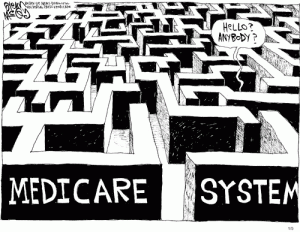A few weeks ago Long-Term Living published an article titled: “National collaborative will foster innovation in senior housing and financing models”. I was intrigued because Senior Housing Forum is all about conversation and collaboration.
A few weeks ago Long-Term Living published an article titled: “National collaborative will foster innovation in senior housing and financing models”. I was intrigued because Senior Housing Forum is all about conversation and collaboration. The article is about a new initiative sponsored by LeadingAge, an organization I am very fond of. The goal of the initiative according to the article is . .
“. . . to develop replicable and financeable solutions that address the needs of varied senior populations, are comprehensive and are integrated with larger community initiatives.”
A worthy goal, but I found myself wondering if in fact, a collaboration by a bunch of entities can really pull it off innovation. It may seem contradictory to the Senior Housing Forum goal of fostering conversation and collaboration, to suggest that a collaborative effort may not be the the best way to innovate. While I hope I am wrong here is my case:
Collaboration
Collaboration by definition is the process of gathering together a group of stakeholders; people who share decision making to solve a problem or set of problems they are mutually invested in. The idea is that by working in a collaborative fashion, new and better ideas will emerge and perhaps as importantly, because there are many minds are looking at both the problem and solutions, it is more likely that someone will identify weaknesses in proposed solutions.
Two Big Collaboration Problems
Collaboration is a good way to solve well defined problems where there is already a set of possible solutions. It is a terrible way to innovate. There are two reasons why collaboration is an ineffective . . . even impossible path to innovation:
1. Unequal Power – Good collaborative efforts put considerable time and effort into making sure all stakeholders have a voice. The process may even include a framework that allows the minor stakeholders have a disproportionately strong voice. Yet for all of that, some participants will have much more influence than others. In some cases it is strength that comes from position and in other cases, it comes from having a strong charismatic or forceful personality.
2. Accommodation – The word collaboration suggests that everyone has a voice and every voice has value. This means that as solutions begin to emerge there is an innate tendency to make sure everyone has contributed to the solution. That each person can say about some part of the solution “That was my idea” or “my contribution.” This means that ultimately, the solution(s) will regress to the mean, in other words regress to something that accommodates everyone even if not optimal.
Collaboration that Leads to Innovation
Yet for all of that, it is possible that collaboration can lead to innovation. Here is how it can work:
Preamble: Innovation requires dreamers and not everyone is an innovator/dreamer. Innovators, are readers, they are curious, they are willing to fail, to even embrace failure, knowing that failure will lead to success. While some people are more adept at dreaming than others, anyone who wants to can learn to be a dreamer and innovator.
- After the collaborative group dissects problem and develops solutions the innovators can go to work.
- Some individual or very small group (one, two or maybe three) takes a look at the problem and the solutions, and begins to think about things. They begin to use both the problem and the solutions as a springboard for dreaming.
- As the dreaming evolves an idea emerges and ultimately blossoms into something brand new, something fresh, something amazing. Something truly innovative.
How are you doing at innovation? What is the most innovative thing you have done in your organization in the last year?
While writing this article I came across this fantastic article from Fast Company: Research-You’re Doing It Wrong. How Uncovering The Unconscious is Key to Creativity. It provides some intriguing insight as to how senior communities and organizations might approach both future development and sales and marketing efforts. -Steve Moran If you like this story it would be a great honor to me if you would subscribe to our email list.
Don’t miss a single issue of Senior Housing Forum, subscribe today. It is free! We do not sell or share your contact information. The posts are practical and never too long. Go to the main page of Senior Housing Forum and on the top you will see a link to our subscription sign-up page. You will receive notification when a new article is posted. You can unsubscribe at any time. Finally: If you know anyone who is looking at emergency call systems I would appreciate the opportunity to talk with them about Vigil Health Solutions.








I was surprised to read your “Collaboration Trap – the Wrong Way to Innovate” article. I have been involved in product development for over 20 years have seen amazing results from taking a collaborative approach. In fact, in my experience, collaboration is key to innovation. The sum of collective experience and viewpoints of multiple experts, is much more powerful than that of a single individual.
The majority of my career has been spent in the high tech sector; which is known for innovation. We have adapted and applied the same collaborative development techniques at Prestige Care Inc., to develop senior solutions with great success. In fact, our memory care product, Expressions, just received a national innovator award from the International Council of Active Aging. Our development process for this product was extremely collaborative.
Not only does collaboration lead to a better solution, it helps with buy-in and adoption of the end product. The key to utilizing collaboration to drive innovation is to follow a proven methodology. It is also vital to have clearly established objectives, and a strong leader who has the ability to assemble and analyze information and to keep the team focused, as well as the ability to exceed consumer expectations by looking beyond traditional solutions.
Hi Hollie:
I appreciate your comments and I think there can be a lot of value that comes out of collaboration. They point I was trying to make, and perhaps did not do a very artful job of it, was that in order to get something truly revolutionary it takes one or at most two, dreamers to really create. I think particularly with this Leading Age example, there will just be too many people who have to be accommodated. The other difficult problem is that once they come up with the “perfect” solution or set of solutions, in order for the rubber to meet the road, someone will have to go “at risk” with some huge dollars to fulfill the experiment.
In the article I wrote a few weeks ago A CCRC for the Middle Class, I described Jeff Petty’s vision to solve at least a part of the impending affordability gap. It is a brilliant idea and I am not sure it could have come from a committee. Yet for as great an idea as it is. He has not been able to find a way to fund it.
The points you make about collaboration to create buy-in are well taken.
Steve
John Steinbeck said of creativity in East of Eden that sometimes a glory lights up in the mind of a man. He went on to say that no idea ever came from a group. The original spark of an idea was always in a single individual’s mind. In his context the “unequal power” was group that would seek to limit the free roaming mind of men. Group collaboration can sometimes limit the minds of those involved, implicitly or explicitly. Introverts like me know the implicit restrictions a group brainstorming session can place upon those who don’t like to speak up without deeper thought.
So I think your post is spot on. Collaboration can lead to innovation via a sharing the problems in need of solution, but the final innovation is going to occur in one person’s head. Often the best way to innovate is to give the dreamer space to roam their mind, unencumbered by accommodating others, until the solution is found.